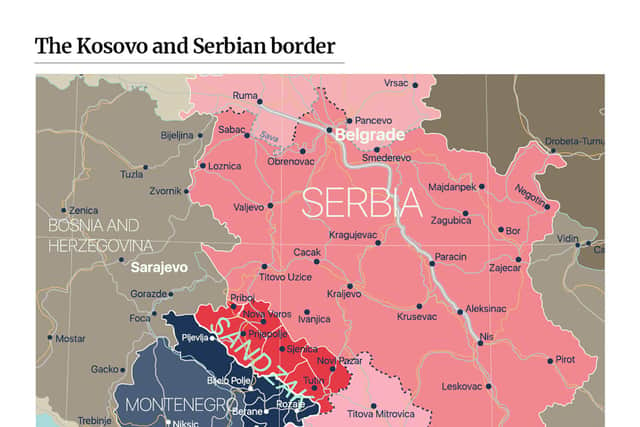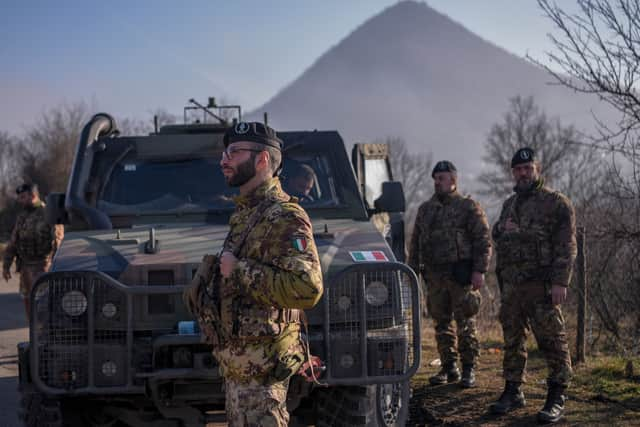Serbia Kosovo unrest: why has country placed its troops on Kosovo border in state of ‘combat readiness’
and live on Freeview channel 276
Serbia has placed its troops on the border with Kosovo on “the full state of combat readiness,” ignoring NATO’s calls for calming down tensions between the two countries.
In a statement, Serbia’s Interior Minister Bratislav Gasic said he “ordered the full combat readiness” of police and other security units and that they be placed under the command of the army chief of staff according to “their operational plan.” He said that he acted on the orders of Serbian President Aleksandar Vucic so that “all measures be taken to protect the Serbian people in Kosovo.”
Advertisement
Hide AdAdvertisement
Hide AdHe added that President Vucic also ordered the special armed forces to be beefed up from the existing 1,500 to 5,000. Serbia’s interior ministry also announced that “all units (will) immediately come under the command of the chief of general staff”. These orders come after army chief general Milan Mojsilovic was dispatched to the border with Kosovo on Sunday (25 December).
Here’s what you need to know about Serbia and Kosovo:
What is the conflict between Kosovo and Serbia?
Kosovo declared independence from Serbia in 2008, but Belgrade has refused to recognise it and encouraged Kosovo’s 120,000 ethnic Serbs to defy Pristina’s authority. Ethnic Serbs make up the majority in the north.
The conflict itself occurred in 1998 to 1999 when ethnic Albanians fought ethnic Serbs and the government of Yugoslavia in Kosovo. The conflict gained widespread international attention and was resolved with the intervention of the North Atlantic Treaty Organization (NATO).


It was essentially settled on 3 June, 1999, when Slobodan Milosevic, then-president of the Federal Republic of Yugoslavia, decided to accept NATO's terms for ending its 78-day bombing campaign. There were reports that Milosevic had launched an ethnic cleansing campaign against Kosovo's ethnic Albanians, which forced NATO troops to launch air strikes against Yugoslavia.
What is happening in Kosovo now?
Advertisement
Hide AdAdvertisement
Hide AdOn Monday (26 December), NATO-led peacekeepers in Kosovo were investigating a shooting incident which took place in Zubin Potok, a town in northern Kosovo where local ethnic Serbs have been manning road barricades for the past two weeks and where tensions have been running high between the two former wartime foes.
The peacekeepers, known as KFOR, said the incident happened near one of their patrols, involving unknown people. A statement said no one was injured, and "we are working to establish all the facts." Kosovo’s government has asked KFOR, which maintains a neutral role, to remove the barricades.
Kosovo recently postponed a local election in early December in four municipalities with a predominantly ethnic Serb population, in an effort to defuse recent tensions. The polls in Northern Mitrovica, Zubin Potok, Zvecan and Leposavic were due on 18 December after ethnic Serb representatives resigned their posts in November to protest against a decision by Kosovo’s government to ban Serbia-issued vehicle licence plates. Serb lawmakers, prosecutors and police officers also abandoned local government posts.
However, unknown gunmen shot and wounded a Kosovo law enforcement officer on 9 December. Some election centres were also damaged, while shooting was heard in the four municipalities. Then on 10 December, an ex-policeman suspected of involvement in attacks against ethnic Albanian police officers was arrested, outraging ethnic Serbs who erected barricades that paralysed traffic around two border crossings.


Advertisement
Hide AdAdvertisement
Hide Ad“We must all come together and do everything we can to preserve peace. We are effectively on the brink of armed conflict because of Pristina’s unilateral actions,” Serbian Prime Minister Ana Brnabic told a press conference last week with several Serbian NGOs in Belgrade.
Comment Guidelines
National World encourages reader discussion on our stories. User feedback, insights and back-and-forth exchanges add a rich layer of context to reporting. Please review our Community Guidelines before commenting.
